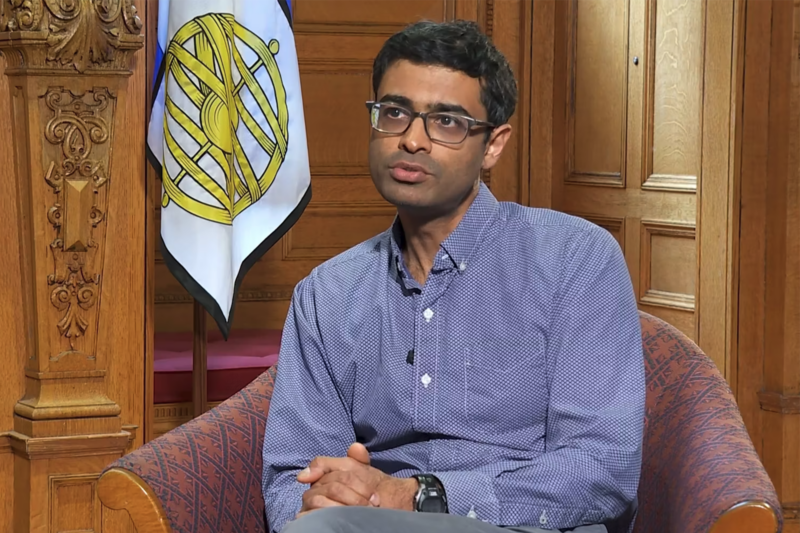Jackson M.P.P. students take 16 credits over two years, including four required foundation courses.
Jackson’s academic requirements are designed to prepare leaders for solving the most pressing problems in global affairs. This means exposing students to foundational ideas in economics, history, and political science as well as building skill as analysts, communicators, and leaders. We do this through a small core of four courses, an integrated professional writing program, a leadership and ethics training workshop, and a summer internship/project requirement.
The formal M.P.P. requirements are 16 credits, demonstrated proficiency in a modern language*, and completion of a summer internship or project. The 16 credits must include the four required core courses listed below (each course is worth one credit). Students must also maintain a grade average of High Pass with at least two Honors grades. All students must complete Jackson’s leadership and ethics training workshop, which will take place in August the week prior to the beginning of their second year and is not taken for academic credit.
*Students who have never studied a modern language (other than English) may elect to enroll in the accelerated language course at Middlebury College in the summer preceding their arrival at Yale. Jackson has established a streamlined application process with the Middlebury College Language Schools, and will fully fund the course, including tuition, room and board. For exigent academic reasons, the Assistant Dean for Graduate Education may exceptionally authorize other students to qualify for this funding opportunity.
Required Courses
GLBL 5020 – Applied Methods of Analysis (Fall, first year)
This course is an introduction to statistics and their application in public policy and global affairs research. It consists of two weekly class sessions in addition to a discussion section. The discussion section is used to cover problems encountered in the lectures and written assignments, as well as to develop statistical computing skills. Throughout the term we cover issues related to data collection (including surveys, sampling, and weighted data), data description (graphical and numerical techniques for summarizing data), probability and probability distributions, confidence intervals, hypothesis testing, measures of association, and regression analysis. The course assumes no prior knowledge of statistics and no mathematical knowledge beyond calculus.
GLBL 5040 – Comparative Politics for Global Affairs (Fall of first or second year)
Economics can tell us with increasing precision what policies maximize growth, welfare, and productivity. But how are policies actually made? Why are so many poor policies adopted and good ones foregone? In this course students investigate how government organization and the structure of political competition shape the conditions for better and worse economic policy making across a range of economic policies including macroeconomic policy, corporate and financial regulation, industrial policy, and trade. Students consider these policy areas in democratic and nondemocratic regimes, and in developed and developing countries.
GLBL 5030 – History and Global Affairs (Spring, first year)
Nobody can understand the present without a keen understanding of the past. After all, history is all we have to go on in providing the resources for making sense of the world we live in. Successful policymakers understand this and turn historical sensibility to their advantage in interpreting the present. They understand how good policy is grounded in sound historical thinking.
The purpose of the core requirement is to introduce advanced students of global affairs to the manifold ways in which history is discussed and perceived today. Different from the social sciences, history as a discipline is less about prediction and more about finding out where we come from and what challenges the past has bequeathed to us. It is also about grasping, in a critical fashion, that we know the future only by the past we project into it.
GLBL 5010 – Economics for Global Affairs (Spring, first year)
This core course introduces students to the critical issues facing the global economy today. One of the main goals of the course is to practice how to use measurement and economic frameworks to analyze current events. The course teaches students how to apply economic reasoning to policy issues in the real world building on the concepts covered in the first-semester economics course and new concepts presented in the course. We use these frameworks to understand questions such as: Why are some countries richer than others? How much is the inequality across countries, and should we worry about it? How are wages and interest rates determined? How do countries conduct fiscal and monetary policy to smooth the business cycle? What determines the gains from international trade and migration?
A diagnostic exam before the first year will determine if students need to take a prerequisite foundational economics course in the fall of the first year to prepare themselves for this course.
Professional Writing Program
The ability to communicate effectively is central to becoming an effective leader and problem solver.
The Jackson School Writing Program has three primary components. First, three core curriculum courses (GLBL 5010, 5030, and 5040)—in addition to their substantive topics—are designed to enhance students’ writing skills across a variety of professional contexts. The primary instructors have designed these writing components in collaboration with the director of the Writing Program to ensure a coherent and holistic professional writing curriculum across the core courses. Second, all Jackson M.P.P. students are able to meet individually with the Writing Program director, who is available to provide detailed feedback on all student writing. Third, the Writing Program offers professional writing classes in both fall and spring semesters that give students ample opportunity to hone their composition and editing skills while introducing them to the genre of professional policy writing and challenges faced by communicators in the field.
By availing themselves of these Writing Program resources, students will develop the professional writing and communication skills necessary to advance their careers as leaders in global affairs.
Summer Experience
M.P.P. students further their academic and professional goals by engaging in an immersive summer experience. Taking place during the summer between the first and second year, the experience gives students an opportunity to complete an internship or research project that is policy related and relevant to the global affairs M.P.P. degree.
Leadership and Ethics Workshop
In August, just prior to the beginning of their second year, M.P.P. students participate in a workshop designed to train students for impactful and ethical leadership in global affairs.
Additional Opportunities
Students also have the option of writing a thesis under the supervision of a Jackson faculty member or Senior Lecturer as well as the opportunity to earn a “Certificate in Program Evaluation” upon completion of a four-course quantitative methods sequence.
Students may present their research to peers in Jackson’s bi-weekly Student Academic Workshop Series.
Building your Individualized Curriculum
In addition to the four core courses, M.P.P. students take courses from throughout Yale’s graduate and professional schools in building their individualized program of study.
Each semester, the Jackson School provides its M.P.P. students with a list of interesting and relevant courses from across the University. The list serves as a guide for students, but students are not limited to choosing courses from the list in building their curriculum that best matches their interests and goals. Students meet with the Assistant Dean for Graduate Education and faculty to design their individual curriculum.


